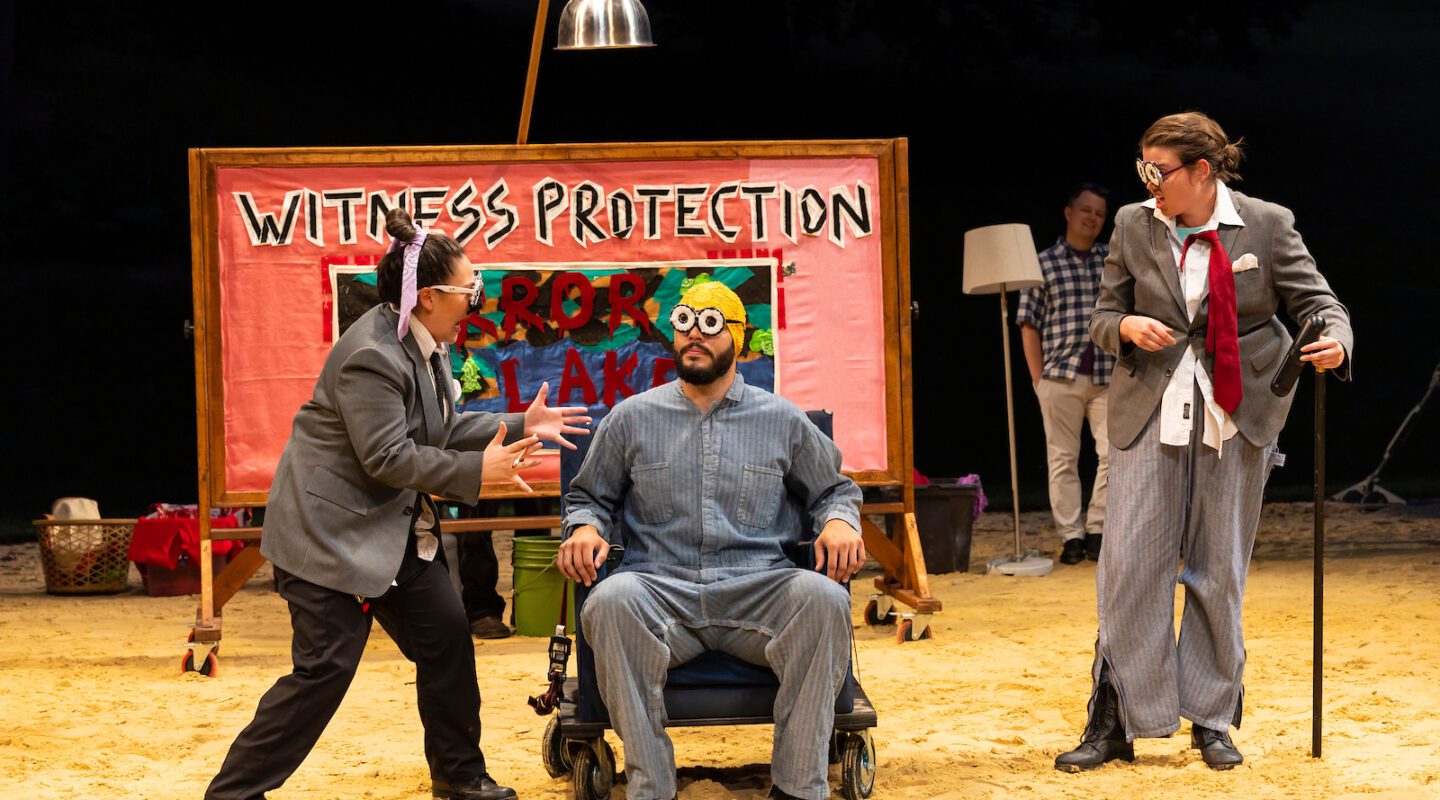
Originally published on July 27, 2022, in The New York Times by Alexis Soloski
Anne Washburn’s 2012 play about a post-pandemic society reckoning with loss has not aged at all, our critic writes.

Stories, like viruses, are transmissible. In the brain, in the blood, they mutate and change. Tragedies become comedies; dramas become myths. And in Anne Washburn’s visionary and wackadoo “Mr. Burns, a Post-Electric Play,” revived by the Hudson Valley Shakespeare Festival, an episode of “The Simpsons” becomes an opera and that opera becomes a way for a post-apocalyptic society to reckon with all it has lost.
After a devastating contagion and concomitant nuclear meltdowns, the American population has shrunk to maybe a million, maybe half that. In the first act, set in the very near future, somewhere in the northeast, a few survivors have gathered around what should be a campfire (did the fire marshal not allow it?) to tell stories. Or as on this night, one particular story. Collectively, they piece together the events and jokes of “Cape Feare,” a Season 5 episode of “The Simpsons.”
Recalling Sideshow Bob’s flourishes and Homer’s doofus behavior connects them to a lost world in a way that feels bearable. Real memories are too painful. Memories of a television show — in a time when televisions no longer work — are what they can manage. In the second act, these scattershot remembrances have been refashioned into a revue. The third act, set decades later and entirely sung through, with music from the composer Michael Friedman, transmutes them further.
“Mr. Burns” debuted in May 2012 at the Woolly Mammoth Theater in Washington, and then moved to Playwrights Horizons. Sept. 11 was more vivid in the cultural memory a decade ago. One passage includes a haunting reference to twin towers of light. But with the pandemic, we have a new cataclysm to absorb, which makes “Mr. Burns,” directed by the festival’s artistic director, Davis McCallum, a timely selection. (Will there always be some new disaster? Will this play always seem of the moment? Yes. Probably. Ugh.) In its invention, its cool ruthlessness, its interrogation of why and how we use narrative, it has not aged at all.

In some ways, the festival, with its sandy floor and jaunty tent provides an ideal location. The opening at the back of the tent looks out into some old-growth trees. Even considering the mowed lawn — a concession to picnickers and the tick-averse — it suggests what the landscape might look like if nature made a comeback. (If the vista had shown the recently decommissioned Indian Point nuclear plant, located just down the Hudson, that might have been even more evocative.) But the play was built for a proscenium stage, not three-quarter seating and McCallum and his designers sometimes struggle to make the action visible to all, particularly in the final act.
The acting is uneven here, the rhythms sometimes off, though Sean McNall, a festival veteran, has a terrific turn as a newcomer in the first act, and Merritt Janson, a welcome Off-Broadway presence, does pointed and specific work as an actor-manager in the second. Zachary Fine, who operates on a very low-key in the first two acts, triumphs in the third. During that act, a chorus member banged a drum straight into my ear, which I could have done without.
And yet, if you are in the area, and you can book a seat away from that drum, you should see “Mr. Burns.” Here’s why: It seems to me that no new work of art — theater, television, film, fiction — has produced in these past few years has really represented the pandemic, at least as I’ve experienced it. Sometimes the more on the nose they were (“Station Eleven,” say) the further away they felt.
“Mr. Burns” doesn’t exactly capture it either, but it captures something else. In these past two years, when I have had a moment of downtime, I have turned to comedies and procedurals, shows that made the world feel regular and knowable. “Mr. Burns” explores the ways that we use stories, even seemingly irrelevant stories, to make sense of our lives. “Mr. Burns” is a play about where we find comfort and it is also, more chillingly, about the limits of that comfort, about how reality can intrude even before the credits roll.
Reality sometimes intruded, even here, out of the city, out of doors. The show’s opening had been delayed owing to coronavirus cases among the cast. The spectators closest to the actors were asked to wear masks; most did. Still, we could lose ourselves for a while, in imagining how a society much like ours might handle a disaster much worse than this one, how we might or might not come through it. To watch this feels pleasurable and painful and mysterious and weird. Or to put it another way: D’Oh.
Mr. Burns, A Post-Electric Play
Through Sept. 17 at Hudson Valley Shakespeare Festival, Garrison, N.Y.; hvshakespeare.org.

